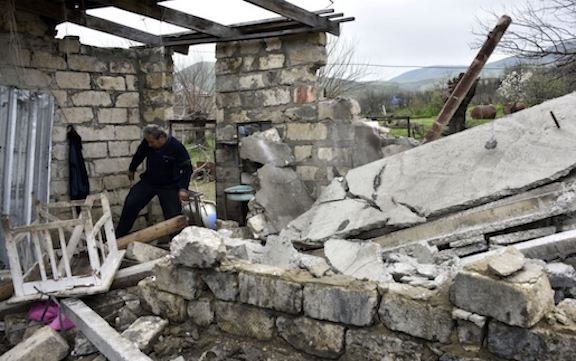BY ARA KHACHATOURIAN
The April 2016 War reinforced the Armenian Nation’s commitment and resilience toward the Artsakh Liberation Movement, which was embraced by every Armenian when it was sparked 30 years ago this year.
The immediate response from all corners of the world to a brutal attack launched by Azerbaijani forces on all Artsakh fronts in the late hours of April 1, 2016, once again showed the world that Armenians, regardless of their geographic location, will not sit idly as their homeland is attacked and will come together to fill in the gaps that exist be that volunteering to serve on the frontlines or coming together to support the soldiers and their families.
The political lessons of the April 2016 War are more opaque, while the effects and impact of those attack are still fresh in the minds—and lives—of Armenians in Artsakh.
For example, the fact that the war was waged by Azerbaijan while its president, Ilham Aliyev, was still in Washington and days after both he and President Serzh Sarkisian met separately with then Vice-President Joe Biden and Secretary of State John Kerry, has not been fully fleshed out. Similarly vague was the Russian response to the attack and its ability—or unwillingness—to rein in the sides more quickly and effectively.
What did follow were a series of summits Vienna and late in St. Petersburg mediated by the leaders of the OSCE Minsk Group co-chairing countries that produced agreements for enhance mechanisms for monitoring along the Artsakh-Azerbaijan border, commonly referred to as the Line of Contact.
One thing is certain: after the 2016 April War Azerbaijan has not ceased its attacks on Armenian positions and our soldiers continue to become casualties of a war that rages on almost 25 years after a cease fire agreement was signed between the warring sides.
However, the inaction by the international community, namely the Minsk Group co-chairing countries—the United States, France and Russia—which have opted to maintain a ridiculously false parity in their assessment of events has emboldened Azerbaijan to not budge from its already savage approach to the Karabakh conflict.
Azerbaijan was not held accountable for its military’s use of brute force and ISIS-inspired tactics against the civilian and military population of Artsakh. These included the beheading of a soldier and parading his severed head, the footage of which wound up on YouTube; the stabbing of an elderly couple in their home in Talish; and the dismemberment of soldiers’ bodies after they had been killed. All of this happened a in a span of a few days in April 2016. The incessant breaches of the 1994 cease fire agreement, forcing an Israeli defense contractor to test fly a live drone on Artsakh targets, risking an international incident, and finally Aliyev’s latest assertions that all of Armenia belongs to Azerbaijan are just a few examples of what happens when official Baku’s actions are left unchecked.
There comes a time when the stated objective for a peaceful and negotiated resolution to the conflict must take into account actual events on the ground and those tasked with fulfilling that aspiration must call a spade a spade.
Around this time last year, I traveled through Talish, the epicenter of the April 2016 War, and had the privilege to spend a couple of hours with our soldiers who are stationed at the frontline there. The 18-, 19- and 20-year-old soldiers perhaps were buoyed by the events of 2016 and were undeterred. I watched as they said a prayer at the makeshift altar they had built in their dugout, with the words “God will protect the soldier” inscribed on it, before assuming their positions mere kilometers from the Azerbaijani border. I listened as they told of their commitment to protect our borders at all costs and I heard when they said that they would remain at their posts “as long as it takes.”
The April 2016 War showed the fragility of the situation and reinforced the fact that Artsakh is the highest priority on our nation’s agenda. We remember those who lost their lives during that war and reaffirm our commitment to shoulder the burden of the soldiers by advocating and advancing the just aspirations of the people of Artsakh and of the Armenian Nation.


















































